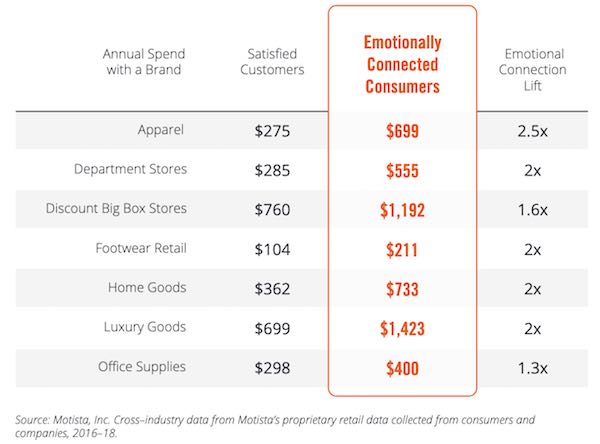As the retail world is on coronavirus lockdown, more than ever marketers are looking for the key to customer loyalty. What is the secret to keeping customers from switching to a competitor with lower prices, faster curbside pickup, or a coupon that drops at just the right time? Motista, a provider of predictive intelligence, thinks it has the answer.Customer affinity.
Customer affinity is the “why” behind the loyalty that makes that loyalty extra sticky. If a customer sticks with you because he or she likes your loyalty program, that loyalty is strong only as long as a competitor doesn’t come out with a better program. Or, if that customer is loyal because you offer good prices and curbside pick-up, what happens when your competitor drops its prices and starts offering the same service? That’s why brand affinity, rather than loyalty, Motista argues, is so powerful.
In its just released study, “Leveraging the Value of Emotional Connection for Retailers,” Motista explains that brand affinity goes deeper than loyalty because it taps into an emotion and sense of self that loyalty alone does not. Let’s take JoAnn Fabric vs. Michaels, for example. Both offer craft supplies, but a crafter might have greater brand affinity for Michaels because it makes them feel more serious about crafting. For some customers, that sense of self can override location, hours, and even discounts and sales. Nike is another example of a brand with strong affinity. Its extremely loyal customer base sticks by the brand, in part, because of what has been called its “aspirational marketing.” Customers don't want to switch, even for a lower price or a cooler look, because they associate the Nike swoosh with their self-esteem.
As Motista puts it:
“An emotional connection occurs when people connect their values, desires, or aspirations to a brand. These connections often live in the unconscious and go unspoken. This emotional connection goes beyond how people perceive a brand or the functional benefits of its products and services. It goes past the likes and dislikes they report in focus groups or customer feedback. When brands connect with people in more meaningful ways, they form more valuable relationships because the brand makes them feel better.”
This, Motista argues, is why high customer affinity creates a loyalty that is so strong.
The company adds that, while most marketers acknowledge the role of emotional connection affecting brand loyalty, many “breakout” brands have turned it into a growth strategy. This isn’t just about affinity itself. It’s about identifying and cultivating the customers most likely to develop it. Brands successful in developing high levels of brand affinity are delivering “extraordinary” results, as measured in spending, lifetime value, length of time spent with a brand, and brand advocacy. “Such companies are defying the stagnation facing the retail sector and are on a path of accelerated growth,” Motista says.
In order to take a serious look at this phenomenon, Motista invested in a two-year study. It indexed the level of emotional connection to buying behavior of more than 100,000 U.S.–based consumers across more than 100 brands. It then compared the behavior (spend level, lifetime value, brand loyalty, and advocacy) of what it terms “very emotionally connected consumers” to those who are simply “satisfied.”

Here’s what it found:
Compared to less emotionally connected customer, high emotionally connected customers . . .
- Spend up to 2x or more with their preferred retailers.
- Have a 306% higher lifetime value.
- Stay with a brand for an average of 5.1 years vs. 3.4 years.
- Recommend brands at much higher rates: 30.2% vs. 7.6%.
Put simply, brands with high emotional affinity outperform their competition. This isn’t accomplished by focusing on short-term promotions or bombarding key demographic groups with personalized mailers. It’s accomplished by identifying the customers the most likely to develop affinity to the brand, then communicating to these customers how the brand relates to they care about. More than short-term sales, the goal is to influence their long-term behavior.
So if you want to outperform your competition, study the strategies and tactics of brands with the highest levels of emotional connection. Think you know which ones they are? Write down your guesses, then check out Motista’s list of the top 30 most emotionally connected brands on p. 9 of the report. In your experience, what makes these brands so successful? I’d like to hear your thoughts.















Discussion
By Thomas Hybki on Jun 03, 2020
Would this be more of a retail focused software program from what you've seen? That is what I am seeing from their website. Looks interesting.